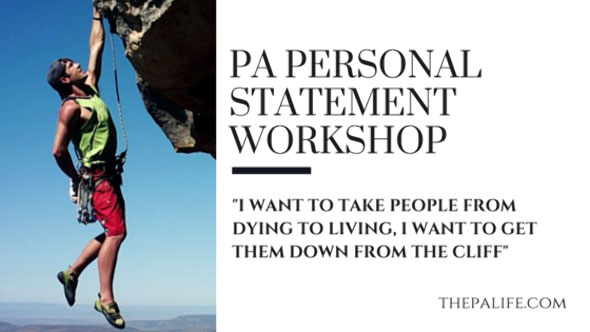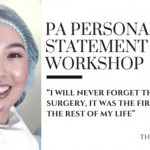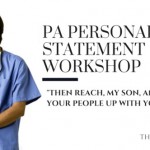In this seventh (and final) installment of our special week-long personal statement workshop, we continue to pull essays submitted from the comments section through our free essay submission process and provide you, and our users, with a more detailed analysis of their essays.
This seventh submission is by Jordan and is a real cliffhanger. Jordan, a rock climber, finds himself on the edge of a cliff both in the Canadian Rockies and while facing the diagnosis of a pulmonary embolism in his wife who is 6 months pregnant. At the edge of his rope, he finds solace in the medical team that saves her life. In a matter of time, his purpose becomes clear: "I want to treat and care for patients. I want to change lives. I want to take people from dying to living. I want to get them down from the cliff."
We will present you with his original essay and our suggestions.
As always, use this as a guide to see where you can improve your own writing, and respect the work of others. It should go without saying this is not your essay, so don’t plagiarize.
Essay 7: “I Want to Take People From Dying to Living, I Want to Get Them Down From the Cliff”
By: Jordan
 So here is my first draft. I know it lacks some cohesion and can certainly be tidied up but I mostly want to know if I am first, headed in the right direction and second, where I should go from here. Thanks
So here is my first draft. I know it lacks some cohesion and can certainly be tidied up but I mostly want to know if I am first, headed in the right direction and second, where I should go from here. Thanks
When I looked down all I could see were dark clouds sweeping up the valley like a tsunami of cold and rain; bad news for two rock climbers a thousand feet off the ground in the Canadian Rockies. Decision time. Do we risk the weather and try to finish the last 500 feet to the summit or do we pack it in and rappel down 5 hours work climbing up Ha Ling Peak with little chance of attempting the climb again. We argued for too long and soon realized we were now subject to the whims of the fickle spring weather in the Rockies. We headed down in the cold and the wet, wishing we had left sooner. While in the uncomfortable embrace of disappointment and a climbing harness, I had no idea that this moment would set the foundation on which I would decide to become a Physician Assistant (PA). I thought to myself, If I can change a life, even just one, how many others will benefit as a result? Each decision we make has a ripple effect that changes not only our lives but also the lives of people around us.
Several years later I found myself stuck on the side of a very different cliff. My wife, who was 6 months pregnant, had developed bilateral pulmonary emboli (PE). It was uncommon for me to find her with tears in her eyes but one Sunday night she woke me up and while struggling to breath, told me that she couldn’t lie down because her back hurt too much. Frightened and unsure what to do, I did my best to diagnose the problem. I had been trained as an EMT but that provided only a little help under such circumstances. I was suspicious that she had developed a PE but her legs showed no signs of deep vein thrombosis. We made the decision to visit the emergency department and after many hours and many tests, the diagnosis was confirmed and treatment began. It was exactly one week later that my wife called me from work with identical symptoms. At this point I had learned much more about PEs and according to the statistics, I became fairly certain I would soon have to say goodbye to my dear wife. I distinctly remember this terrible, wrenching feeling in my gut, the kind you get when your big brother punches you for being his little brother. Never in my life had I a wished that I could do more for a person than at that moment. I didn’t have to say goodbye. The doctors and PAs changed her life. They took her from dying to living. They got her down from the cliff.
It certainly wasn’t a light bulb moment. In fact, I had decided I wanted to be a PA almost a year prior. At the time I was the director of clinical research for a small industry research company. I worked with patients in nearly all-therapeutic areas and together with our doctors and PAs we did our best to provide comfortable quality care to our patients as we investigated new medications. While my career was going well, I soon recognized that the part of my job I enjoyed most was the time I spent with my patients, conducting interviews, drawing blood, answering questions and providing education. I wanted more of that and while dodging traffic on the way to the ER, I realized that my desire to help my wife was a magnified version of what I had felt with all of my patients. Each interaction we have provides an opportunity for us to react and our reactions can change the lives of countless people even if we just start with one. Getting stuck on a cliff taught me that. I wanted desperately to finish Ha Ling Peak, but even more I wanted to be safe. I wanted a good professional career, but even more I want to treat and care for patients. I want to change lives. I want to take people from dying to living. I want to get them down from the cliff.
I never finished climbing Ha Ling Peak and finishing was probably never the point. Everyday there are limitless factors that are out of our control that will get us stuck on the cliff. Our job is to react and adapt to those changes in our circumstance. We are all shaped by moments, tiny portions of our everyday lives that form the majority of who we will become. I guess if you put these moments together you might call it experience. Whatever it’s called, my moments have fixed in my mind a determined resolution to become PA.
Suggestions and Revisions
By: Sue Edmondson (personal statement collaborative)
Hi Jordan,
You’re a good writer, a huge plus, and have an excellent, easy to read yet sophisticated style. All those are sure to grab the attention of admissions folks. You’ve improved the essay, but it still needs work.
You open with a literal cliffhanger, and I see that you’re tied to the mountain climbing experience. The problem is that it doesn’t work with the essay — it just doesn’t fit in with the points you’re making about wanting to be a PA. I think it’s most apparent at the beginning and ends of the essay which are general philosophical statements. You’re straining to tie the climbing experience with your work/life experiences because you like it so much. (I understand — what a dramatic, scary, thrilling adventure). But if you are determined to open with the climbing experience, you need to rethink how you’ll make it work thematically. Right now, it’s like reading about an apple in one sentence, about broccoli in the next. It’s that disconnected.
Have a couple of friends or relatives read this part: “While in the uncomfortable embrace of disappointment and a climbing harness, I had no idea that this moment would set the foundation on which I would decide to become a Physician Assistant (PA). I thought to myself, If I can change a life, even just one, how many others will benefit as a result? Each decision we make has a ripple effect that changes not only our lives but also the lives of people around us,” and ask if they see how you get from the disappointment of leaving the mountain to wanting to change lives by becoming a PA.
The other issue is that you talk in depth about your wife’s experience but then say it wasn’t a light bulb moment, that you’d already decided to be a PA. That undermines the whole episode (which by the way, is too long, although I was relieved to learn she survived).
Skip generalities. They don’t help admissions folks know you, and that’s what they’re looking for. It’s tempting to philosophize, but this essay is not the place.
You are on track when you start to talk about your work experiences, and when you talk about how the PAs and doctors impacted your wife’s treatment. In those places you touch on why you want to be a PA. If you’re going to use your wife’s experience, focus more on the PA interactions and delete the beginning of the next paragraph. Otherwise, pick a patient that you treated and worked on with a PA.
Keep going. Writing is rewriting!
Sue Edmondson
Is your mom or dad really giving you honest feedback on your personal statement?
Parents are full of great advice, but when it comes to your personal statement family and friends don't make the best editorial team.
 We offer a bit of free guidance to anyone who takes the time to submit their essay in the comments section of the blog. But your essay needs more than the sympathetic feedback provided by a friendly relative.
We offer a bit of free guidance to anyone who takes the time to submit their essay in the comments section of the blog. But your essay needs more than the sympathetic feedback provided by a friendly relative.
For as little as $59 you can have:
- Personal guidance from our team of professional (unbiased) writers, with inside knowledge of the PA school personal statement. (We have personally interviewed 12 of the top PA school admissions directors from across the country.)
- Telephone consultations are included with all purchases above the single edit level. It's often hard to communicate exactly what you want hundreds of miles away; for this reason, we offer the option to edit right alongside us over the telephone while sharing in real-time over Google Docs.
- We provide feedback, advice and help with brainstorming and topic creation.
- We will help with a "final touch up" before the big day just in case your essay needs a bit of polish.
Here is what one of our recent clients had to say:
We are currently accepting essays in all iterations. We have flexible pricing and can do everything from a single one-time edit to a full-service review that will take you from beginning to a finished product. Hurry, as we can only accept a few essays each month.
Click here to post your essay or learn more about our service.
Have you enjoyed what you read?
I hope you have been enjoying this personal statement workshop. Before you go, make sure to sign up for automatic updates from the blog or subscribe with Feedly (my favorite RSS reader). And if you haven't already, sign up for the FREE email newsletter (down below) or connect with me on Facebook or Twitter. I’ll definitely respond, and I look forward to meeting you!
Cheers,
Stephen
View all posts in this series
- How to Write the Perfect Physician Assistant School Application Essay
- The Physician Assistant Essay and Personal Statement Collaborative
- Do You Recognize These 7 Common Mistakes in Your Personal Statement?
- 7 Essays in 7 Days: PA Personal Statement Workshop: Essay 1, “A PA Changed My Life”
- PA Personal Statement Workshop: Essay 2, “I Want to Move Towards the Forefront of Patient Care”
- PA Personal Statement Workshop: Essay 3, “She Smiled, Said “Gracias!” and Gave me a Big Hug”
- PA Personal Statement Workshop: Essay 4, “I Have Gained so Much Experience by Working With Patients”
- PA Personal Statement Workshop: Essay 5, “Then Reach, my Son, and Lift Your People up With You”
- PA Personal Statement Workshop: Essay 6, “That First Day in Surgery was the First Day of the Rest of my Life”
- PA Personal Statement Workshop: Essay 7, “I Want to Take People From Dying to Living, I Want to Get Them Down From the Cliff.”
- Physician Assistant Personal Statement Workshop: “To say I was an accident-prone child is an understatement”
- 9 Simple Steps to Avoid Silly Spelling and Grammar Goofs in Your PA School Personel Statement
- 5 Tips to Get you Started on Your Personal Essay (and why you should do it now)
- How to Write Your Physician Assistant Personal Statement The Book!
- How to Write “Physician Assistant” The Definitive PA Grammar Guide
- 101 PA School Admissions Essays: The Book!
- 5 Things I’ve Learned Going Into My Fourth Physician Assistant Application Cycle
- 7 Tips for Addressing Shortcomings in Your PA School Personal Statement
- The #1 Mistake PRE-PAs Make on Their Personal Statement
- The Ultimate PA School Personal Statement Starter Kit
- The Ultimate Guide to CASPA Character and Space Limits
- 10 Questions Every PA School Personal Statement Must Answer
- 5 PA School Essays That Got These Pre-PAs Accepted Into PA School
- 7 Questions to Ask Yourself While Writing Your PA School Personal Statement
- 101 PA School Applicants Answer: What’s Your Greatest Strength?
- 12 Secrets to Writing an Irresistible PA School Personal Statement
- 7 Rules You Must Follow While Writing Your PA School Essay
- You Have 625 Words and 2.5 Minutes to Get Into PA School: Use Them Wisely
- What’s Your #1 Personal Statement Struggle?
- 31 (NEW) CASPA PA School Personal Statement Examples
- How to Prepare for Your PA School Interview Day Essay
- Should You Write Physician Associate or Physician Assistant on Your PA School Essay?
- Meet the World’s Sexiest PA School Applicants
- PA School Reapplicants: How to Rewrite Your PA School Essay for Guaranteed Success
- How to Write a Personal Statement Intro that Readers Want to Read
- PA School Reapplicant Personal Statement Checklist
- How to Deal with Bad News in Your Personal Statement
- Inside Out: How to use Pixar’s Rules of Storytelling to Improve your PA Personal Statement
- Ratatouille: A Pixar Recipe for PA School Personal Statement Success
- Personal Statement Panel Review (Replay)
- Mind Mapping: A Tool for Personal Statements, Supplemental Essays, and Interviews
- Start at the End: Advice for your PA School Personal Statement

















Hi. I would really appreciate some feedback on my personal statement please and thank you! (I know I’m about 100 characters over the limit)
My whole life I have been searching for my purpose. I remember being a child and having these ambitious dreams of changing the world, but I never knew how. First, I wanted to be an astronaut, then a fashion designer, and even wanted to join the Peace Corps. As I grew older I was still that uncertain child swaying from one career choice to the next. I entered college as an undecided major, considering several majors before finally settling on exercise science. Little did I know this major would reveal a vast curiosity about science and the complexities of the human body that I never knew I yearned for. My love for science, my desire to learn, and passion for helping others solidified my decision in wanting to work in healthcare. Through research, and patient care experiences I have decided the physician assistant profession is right for me.
After graduating from High Point University, I began working as a Certified Nurse Assistant (CNA) in a hospital in an oncology unit. One night, as I was helping a patient back into her bed, she began to cry as she told me about having to tell her kids about her terminal cancer diagnosis. As she laid her frail hand on top of mine, she said to me “don’t you ever come to this hospital thinking you’re here just to do a job, because you never know when you’re making a difference in someone’s life.” For the first time in my life, in that very moment, I felt purpose, a feeling I had been craving my whole life. Although I thought the tasks I was doing for this woman were trivial at the time, she valued them, and that fulfilled me. From then on, I experienced fulfillment from my duties as a CNA, helping my patients in their most vulnerable times. This feeling of purpose and fulfillment is something I desire to feel everyday. At last, I was no longer uncertain. I knew this is where I wanted to be. The only thing missing was being able to help my patients medically. I desire to expand my knowledge, to diagnose, treat, and provide excellent patient care. I know I belong at the forefront of medicine.
Through my patient care experiences I have learned to work both independently and as a member of a team. One night, I walked into my patient’s dimly lit room, and could see her face peeking from under a mountain of blankets. She was shivering uncontrollably, and I immediately knew something was wrong. I notified the nurse and took the patient’s vitals which were extremely abnormal. I had a feeling the patient was going into septic shock. The rapid response team rushed to the room, and after working together the patient was transported to the ICU. In this case, no one person was responsible for saving the patient. Every person within the team played a vital role in getting our patient the immediate care she needed. I’m a firm believer that no one person has all the answers. As a PA I would enjoy autonomy but would also be able to continue my love for working as a team and practice collaborative medicine.
Working as a CNA has afforded me the opportunity to spend a lot of time with my patients, and has shown me how much I enjoy patient care. Whether my time is spent listening to my 97 year old patient tell me how he met the love of his life, comforting my cancer patient while she grieves the loss of her once long blonde hair, or helping my patient with their personal hygiene my time is valued. Being able to spend more time with patients is an aspect I admire about the PA profession. I have always been impressed by my primary care PA, who does not just complete an exam then leave but takes the time to thoroughly discuss my health, educate me, and makes sure I’m really doing okay. A patient knowing they have someone to talk to and someone who genuinely cares is equally important to health and any healing process.
Although I work in an oncology unit, I’ve also encountered other areas of medicine. I find myself intrigued not only with the process of chemotherapy treatment, but pain management in my sickle cell patients, the precision of the sutures in my surgical patients, the complexities involved in an ectopic pregnancy, and cases that could have been avoided with better lifestyle choices. Being able to smoothly transition from one specialty to the next is a unique characteristic of the PA profession I value. As a person with a diverse set of interests, having lateral mobility is important to me. I want to continue the mission of the PA profession and improve healthcare access, and specifically to those in underserved communities. I want to work in primary care, but knowing there are always other specialities waiting is a satisfying feeling.
I may not be living out my childhood dreams of changing the world, but as a PA I will have the opportunity everyday to change each and every one of my patient’s world. Each patient I have had the privilege to take care of has taught me what it feels like to be fulfilled and have a purpose, and for that I am thankful. I am ready and dedicated to take the steps to help my patients further, and I know that day will come. I know I will become a PA.
I plan to submit this on my CASPA form any feedback is appreciated.
Everyone has something in their life that opens their heart and mind to helping others. The desire and yearning to help others is an essential trait for a potential physician assistant. For me it was apparent with the introduction of fibromyalgia into my daily life. Fibromyalgia has become a rosebush in our family. There are many thorns and blossoms. Thorns we are sure to encounter and blossoms we intended to enjoy when they bloom.
I am determined not to let the thorns get in the way. During my career in healthcare insurance, while working a case that included a clinical study I saw symptoms that exemplified the same symptoms my husband was experiencing. During this time, I was able to attend a fibromyalgia seminar designed for clinicians. I learned of a doctor in our area who was studying this syndrome. I managed to get my husband in for an appointment with one of his associates. After many tests and ruling out other potential diagnosis, his diagnosis was fibromyalgia.
We were relieved to know what the problem was. This diagnosis came at an age ten years younger than his mother’s diagnosis for the same condition. A rheumatologist later diagnosed my daughter with fibromyalgia at the mere age of sixteen. This was at the height of her athletic ability and ten years younger than her father was diagnosised. Understanding the problem has allowed our family to stay away from the thorns in our rosebush and we can stay closer to the actual blossoms.
Understanding the underlying parts of the syndrome of pain and triggers for different symptoms allow us to stay closer to the actual roses in our rosebush. There currently is no cure for this syndrome. The treatments for each individual are different. We have cultivated treatments, which allow my husband and daughter to function a somewhat normal life. Just like a rose, the underlying thorns are there but we see more of leaves and smell the fragrance of the rose.
This chronic condition is a part of our family life. We believe the treatment will produce many roses in our rosebush. As a physician assistant, I believe it is possible to nurture our rosebuds to flourish and mitigate the presence of the thorns.